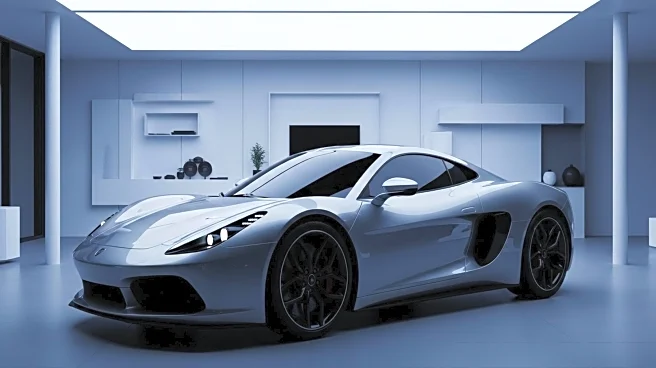What's Happening?
Porsche is undergoing a strategic realignment of its product lineup due to significant market challenges in the US and China. The company has decided to scale back its electric vehicle plans and focus more on combustion engines and plug-in hybrids. This decision comes as Porsche faces declining sales in China, where domestic brands are gaining popularity, and new tariffs in the US that have made its vehicles less competitive. Additionally, the regulatory environment in the US has shifted towards promoting internal combustion vehicles, complicating Porsche's electric vehicle ambitions. As part of its realignment, Porsche announced that its new SUV series, initially planned as all-electric, will now be offered with combustion engines and hybrid models. The company is also rescheduling the development of its new electric vehicle platform, pushing back the introduction of battery-electric versions of its SUVs by up to ten years.
Why It's Important?
The strategic shift by Porsche highlights the challenges faced by foreign automakers in adapting to rapidly changing market conditions and regulatory environments. The decision to prioritize combustion engines and hybrids over electric vehicles could impact Porsche's long-term sustainability goals and its position in the growing EV market. This move may also affect the company's financial performance, as indicated by its revised operating profit forecast and the anticipated €1.8 billion hit due to delayed EV introductions. The broader implications for the automotive industry include potential shifts in investment strategies and product development priorities, as companies navigate geopolitical tensions and evolving consumer preferences. Stakeholders such as investors, environmental advocates, and industry competitors will be closely monitoring Porsche's adjustments and their impact on the company's market position.
What's Next?
Porsche is actively seeking a new CEO to lead the company through this challenging period. The search is reportedly focusing on candidates both within and outside the company, with the Porsche-Piëch owner family involved in discussions. The outcome of this leadership change could influence Porsche's strategic direction and its ability to recover market momentum. Additionally, the company's parent, Volkswagen Group, has lowered its financial outlook, indicating broader implications for the group's operations. As Porsche navigates these changes, the automotive industry may see shifts in competitive dynamics, particularly in the luxury and electric vehicle segments.
Beyond the Headlines
Porsche's decision to realign its product strategy reflects deeper issues within the automotive industry, including the impact of geopolitical tensions and cultural shifts on consumer behavior. The move away from electric vehicles in the US market highlights the influence of political and regulatory factors on corporate strategies. This development may also spark discussions on the ethical and environmental responsibilities of automakers in balancing profitability with sustainability goals. Long-term, Porsche's adjustments could lead to shifts in industry standards and consumer expectations regarding vehicle technology and environmental impact.










